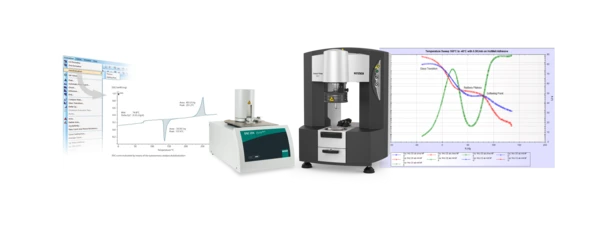
09.01.2023 by Aileen Sammler
DSC and Rotational Rheometry: Two Complementary Techniques
NETZSCH is the only company on the market that offers both rotational and capillary rheometers and, in combination with other thermal analysis instruments such as Differential Scanning Calorimetry (DSC), provides extensive analysis capabilities from a single source.
Differential Scanning Calorimetry, DSC, is one of the most frequently used thermal analysis methods for quality control. It enjoys great popularity, especially because it provides extensive information on material properties such as Temperatura de Transición VítreaThe glass transition is one of the most important properties of amorphous and semi-crystalline materials, e.g., inorganic glasses, amorphous metals, polymers, pharmaceuticals and food ingredients, etc., and describes the temperature region where the mechanical properties of the materials change from hard and brittle to more soft, deformable or rubbery.glass transition, melting or crystal-to-crystal conversion, and because it is easy and fast to use.
Any DSC measurement on polymers should include three measurement runs consisting of two heating measurements, between which the sample is cooled at a controlled rate. Each measurement curve can give different insights and information about the sample. If the second heating curves of two materials are similar, quality control would conclude that it is the same material. However, additional tests with the Kinexus rotational rheometer can show that these materials differ in their molecular weight.
PEEK (polyether ether ketone) is used for high-performance applications at high temperatures, but due to its good combination of properties, it is also becoming increasingly established in the medical field.

